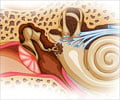Eur Arch Otorhinolaryngol 2020 Feb 01
Real ear measurement (REM) and auditory performances with open, tulip and double closed dome in patients using hearing aids.
Gazia F, Galletti B, Portelli D, Alberti G, Freni F, Bruno R, Galletti F
The aim of the study is to evaluate the importance of acoustic modifications generated by different commercially available ear-tips, focused on domes ...
Read More
Source: PubMed
Audiol. Neurootol. 2020 Jan 31
Hearing Aid Treatment for Patients with Mixed Hearing Loss. Part II: Speech Recognition in Comparison to Direct Acoustic Cochlear Stimulation.
Wardenga N, Snik AFM, Kludt E, Waldmann B, Lenarz T, Maier H
The conventional therapy for severe mixed hearing loss is middle ear surgery combined with a power hearing aid. However, a substantial group of patien ...
Read More
Source: PubMed
J. Acoust. Soc. Am.
Acoustic feedback path modeling for hearing aids: Comparison of physical position based and position independent models.
Sankowsky-Rothe T, Schepker H, Doclo S, Blau M
Acoustic feedback in hearing aids occurs due to the coupling between the hearing aid loudspeaker and microphones. In order to reduce acoustic feedback ...
Read More
Source: PubMed
J. Speech Lang. Hear. Res. 2020 Jan 31
The Acquisition of Productive Plural Morphology by Children With Hearing Loss.
Davies B, Xu Rattanasone N, Davis A, Demuth K
Purpose Normal-hearing (NH) children acquire plural morphemes at different rates, with the segmental allomorphs /-s, -z/ (e.g., cat-s) being acquired ...
Read More
Source: PubMed
Am J Audiol 2020 Jan 31
Words-in-Noise Test Performance in Young Adults Perinatally HIV Infected and Exposed, Uninfected.
Torre P, Russell JS, Smith R, Hoffman HJ, Lee S, Williams PL, Yao TJ
Purpose The purpose of this study was to compare Words-in-Noise (WIN) data between young adults with perinatal HIV (PHIV) infection and those with PHI ...
Read More
Source: PubMed
Eur Arch Otorhinolaryngol 2020 Feb 01
Real ear measurement (REM) and auditory performances with open, tulip and double closed dome in patients using hearing aids.
Gazia F, Galletti B, Portelli D, Alberti G, Freni F, Bruno R, Galletti F
The aim of the study is to evaluate the importance of acoustic modifications generated by different commercially available ear-tips, focused on domes ...
Read More
Source: PubMed
Audiol. Neurootol. 2020 Jan 31
Hearing Aid Treatment for Patients with Mixed Hearing Loss. Part II: Speech Recognition in Comparison to Direct Acoustic Cochlear Stimulation.
Wardenga N, Snik AFM, Kludt E, Waldmann B, Lenarz T, Maier H
The conventional therapy for severe mixed hearing loss is middle ear surgery combined with a power hearing aid. However, a substantial group of patien ...
Read More
Source: PubMed
J. Acoust. Soc. Am.
Acoustic feedback path modeling for hearing aids: Comparison of physical position based and position independent models.
Sankowsky-Rothe T, Schepker H, Doclo S, Blau M
Acoustic feedback in hearing aids occurs due to the coupling between the hearing aid loudspeaker and microphones. In order to reduce acoustic feedback ...
Read More
Source: PubMed
J. Speech Lang. Hear. Res. 2020 Jan 31
The Acquisition of Productive Plural Morphology by Children With Hearing Loss.
Davies B, Xu Rattanasone N, Davis A, Demuth K
Purpose Normal-hearing (NH) children acquire plural morphemes at different rates, with the segmental allomorphs /-s, -z/ (e.g., cat-s) being acquired ...
Read More
Source: PubMed
Am J Audiol 2020 Jan 31
Words-in-Noise Test Performance in Young Adults Perinatally HIV Infected and Exposed, Uninfected.
Torre P, Russell JS, Smith R, Hoffman HJ, Lee S, Williams PL, Yao TJ
Purpose The purpose of this study was to compare Words-in-Noise (WIN) data between young adults with perinatal HIV (PHIV) infection and those with PHI ...
Read More
Source: PubMed








